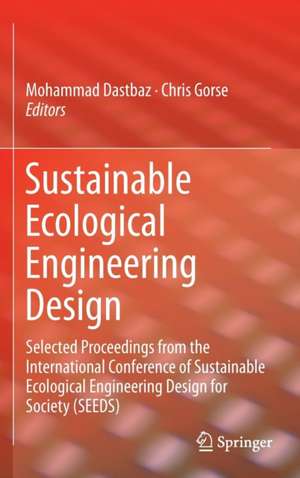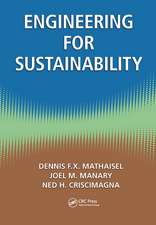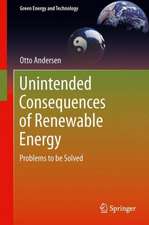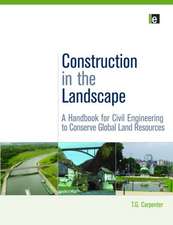Sustainable Ecological Engineering Design: Selected Proceedings from the International Conference of Sustainable Ecological Engineering Design for Society (SEEDS)
Editat de Mohammad Dastbaz, Chris Gorseen Limba Engleză Hardback – 20 mai 2016
| Toate formatele și edițiile | Preț | Express |
|---|---|---|
| Paperback (1) | 1549.36 lei 6-8 săpt. | |
| Springer International Publishing – 27 mai 2018 | 1549.36 lei 6-8 săpt. | |
| Hardback (1) | 1555.51 lei 6-8 săpt. | |
| Springer International Publishing – 20 mai 2016 | 1555.51 lei 6-8 săpt. |
Preț: 1555.51 lei
Preț vechi: 1896.97 lei
-18% Nou
Puncte Express: 2333
Preț estimativ în valută:
297.64€ • 311.60$ • 246.28£
297.64€ • 311.60$ • 246.28£
Carte tipărită la comandă
Livrare economică 05-19 aprilie
Preluare comenzi: 021 569.72.76
Specificații
ISBN-13: 9783319326450
ISBN-10: 3319326457
Pagini: 318
Ilustrații: XXIX, 389 p. 145 illus., 114 illus. in color.
Dimensiuni: 155 x 235 x 24 mm
Greutate: 0.76 kg
Ediția:1st ed. 2016
Editura: Springer International Publishing
Colecția Springer
Locul publicării:Cham, Switzerland
ISBN-10: 3319326457
Pagini: 318
Ilustrații: XXIX, 389 p. 145 illus., 114 illus. in color.
Dimensiuni: 155 x 235 x 24 mm
Greutate: 0.76 kg
Ediția:1st ed. 2016
Editura: Springer International Publishing
Colecția Springer
Locul publicării:Cham, Switzerland
Cuprins
Part 1. Sustainability and the Policy Landscape.- The Meaning of Sustainability.- The Patchwork Politics of Sustainable Communities.- What Has Posterity Ever Done for Us: An Ethical Framework for UK Climate Change Policy?.- The Rocky Road of Post-Capitalist Grassroots Experimentation.- Part 2. Sustainability and Technology.- An Evaluation of Thermal and Lighting Performance within an ETFE Structure.- Double Skin Façades for the Sustainable Refurbishment of Nondomestic Buildings: A Life Cycle Environmental Impact Perspective.- Off the Shelf Solutions to the Retrofit Challenge: Thermal Performance and Comfort.- African Energy Plus construction – A Case Study of House Rhino.- Smart Badge for Monitoring Formaldehyde Exposure Concentration.- Part 3. Survey, Measuring and Modeling.- A Case Study of the Metrics of Capturing the ‘Green’ Improvements on a New Office Building.- Building Surveys to Inform Assessment of Initial Conditions in a Property Prior to Thermal Upgrade.- A New Experiment and Modeling Work to Jointly Identify the Building Envelope’s Thermal Parameters and a Physical Solar Aperture.- Part 4. Measuring.- Quantifying the Effect of Window Opening on the Measured Heat Loss of a Test House.- A Methodology for Identifying Gaps Between Modeled and Measured Energy Performance in New-Build Social Housing.- Evaluating Natural Ventilation in Future Climate Scenarios as Part of a Long-Term Non-Domestic Retrofit Strategy for an Educational Facility.- Part 5. Building and Infrastructure.- Thermally Modeling Bio-Composites with Respect to an Orientated Internal Structure.- Strength Related Geotechnical Testing of Lateritic Soil Prior to the Application of Microbially Induced Calcite Precipitation Treatment.- Part 6. Water.- Development of Sustainable Drinking Water Quality Solutions for Rural Communities in the Developing World.- Management of Water Resources in the Amazon Region.- Part 7. Cities and Neighbourhoods.- Overcoming Barriers to Making Cities More Sustainable: How Can Short-Term Thinking Help Achieve Long-Term Goals?.- The Rejuvenation of a Historical Neighbourhood in South Africa.- Part 8. Comfort, Behaviour and Payback.- Modelling the Delivery of Residential Thermal Comfort and Energy Savings: Comparing How Occupancy Type Affects the Success of Energy Efficiency Measures.- Analysing the Technical and Behavioural Shifts of Social Housing Tenants Following the Retrofitting of External Wall Insulation.- Switch, Don’t Save.- Analyzing the Payback Time of Investments in Building Automation.- A New Experiment and Modelling Work to Jointly Identify the Building Envelope’s Thermal Parameters and a Physical Solar Aperture.
Notă biografică
Dr. Mohammad Dastbaz is Dean of Faculty of Arts, Environment and Technology and Professor of Informatics at Leeds Metropolitan University. Professor Dastbaz’s research work over recent years has been focused on the use and impact of emerging technologies in society, particularly learning, training and the development of “eGovernment.” Dr. Dastbaz has led EU and UK based funded research projects and has been the Symposium Chair of Multimedia Systems in IEEE’s Information Visualisation (IV) conference since 2002. He has over 50 refereed publications, including numerous journal paper articles, conference papers, book chapters and books on e-learning, eGovernment, and the design and development of Multimedia Systems. Professor Dastbaz is a Fellow of the British Computer Society and UK’s Higher Education Academy as well as the professional member of ACM and IEEE’s computer society.
Dr. Christopher Gorse is Director of Leeds Sustainability Institute, Head of the Centre for the Built Environment and Professor of Construction and Project Management at Leeds Beckett University. He is an Engineering Professors Council Member, Chartered Builder, Vice Chair for the Association of Researchers In Construction Management leading research projects in the energy, sustainability and building performance. Chris is an established author with publications in management, law, construction and refurbishment. While working in the construction industry, he operated as an engineer and project manager working on both building and civil engineering projects and continues to undertake legal and technical consultancy.
Dr. Christopher Gorse is Director of Leeds Sustainability Institute, Head of the Centre for the Built Environment and Professor of Construction and Project Management at Leeds Beckett University. He is an Engineering Professors Council Member, Chartered Builder, Vice Chair for the Association of Researchers In Construction Management leading research projects in the energy, sustainability and building performance. Chris is an established author with publications in management, law, construction and refurbishment. While working in the construction industry, he operated as an engineer and project manager working on both building and civil engineering projects and continues to undertake legal and technical consultancy.
Textul de pe ultima copertă
This book focuses on the impacts of the built environment, and how to predict and measure the benefits and consequences of changes taking place to address sustainability in the development and building industries. It draws together the best treatments of these subjects from the Leeds Sustainability Institute’s inaugural International Conference on Sustainability, Ecology, Engineering, Design for Society (SEEDS). The focus of discussion is on understanding how buildings and spaces are designed and nurtured to obtain optimal outcomes in energy efficiency and environmental impacts. In addition to examining technical issues such as modeling energy performance, emphasis is placed on the health and well-being of occupants. This holistic approach addresses the interdependence of people with the built and natural environments. The book’s contents reflect the interdisciplinary and international collaboration critical to assembly of the knowledge required for positive change.
Caracteristici
Presents leading-edge research at the intersection of Sustainability, Ecology, Engineering, and Design Energy, building performance and physics research is examined within the context of health, life quality and ecology Includes coverage of energy efficiency, modeling energy performance, retrofitting, lighting, green materials, low-carbon building design, lean construction and historical preservation Includes supplementary material: sn.pub/extras










